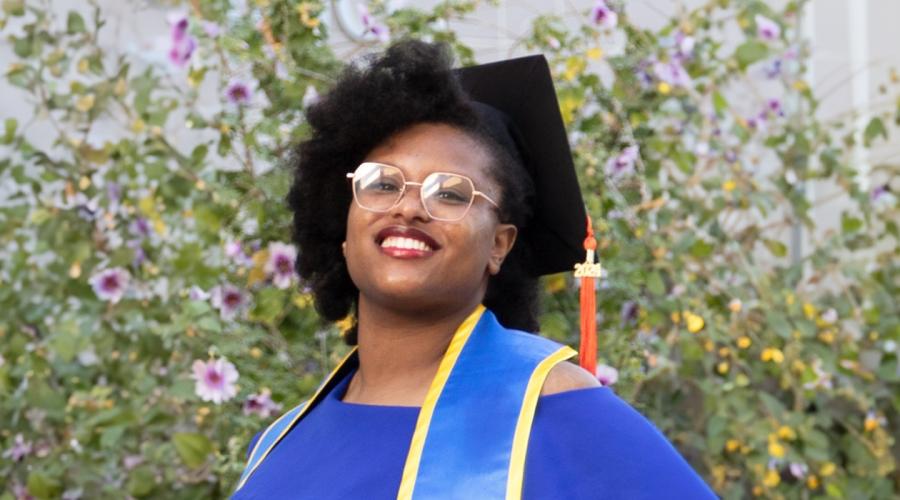
From Diagnosis to Diploma: Nyalah Payne on Her Journey with Lupus
At 13, I was diagnosed with systemic lupus erythematosus (SLE), an autoimmune disease that attacks the body’s joints and organs, including the skin, lungs, and kidneys. Lupus has no cure.
A dermatologist diagnosed me after a biopsy on a butterfly rash on my face. When they explained lupus and its symptoms, I felt confused, frustrated, and scared. Thankfully, my mother was incredibly supportive and reassured me that we would fight lupus together.
My mother took me to UC San Francisco, where the doctors thoroughly explained my treatment plan and answered all our questions. I am incredibly grateful for their professionalism, care, and patience. They prescribed medications and vitamins and closely monitored my health through tests to ensure I was improving.
The doctors always took the time to explain everything to my mom and me, and we greatly appreciated their patience. They made me feel like I was important, taking the time to talk instead of saying “hi” and “bye” for a few seconds before running to their next patient. Now that I’ve transitioned to adult care at the UCSF Rheumatology and Nephrology Clinic, I am grateful for the same caring treatment I received at the Pediatric Lupus Program.
Coping with Challenges
Despite my diagnosis, I resolved to not let lupus prevent me from reaching my goals or succeeding academically. I didn’t want it to change my personality. So, I continued to work extremely hard in school, and sometimes, I had to fake being happy when in significant pain.
Lupus symptoms come in many different forms. My frequent issues are muscle soreness and fatigue, but initially, I dealt with everything: muscle soreness, fatigue, weakness, joint pain, inflamed kidneys, and a butterfly rash.
On top of the symptoms, I had to deal with bullies making hateful comments about having a shiny face from my ointment or wearing a wide-brim hat for sun protection. I did my best to ignore them and focused on my well-being.
When I encountered situations that made me depressed, I needed to find ways to cope. I found comfort in drawing, listening to music, reading, watching movies, and playing video games. Sometimes, it just felt good to wrap myself up in a blanket and immerse myself in a podcast.
My advice to others in a similar situation would be to find healthy habits that make you feel better, even if it’s just a little bit. Sometimes, it can be difficult to keep pushing forward without an outlet.
Handling College Responsibilities
College presented a heavier workload than middle and high school. It was necessary for me to take naps and complete assignments at intervals during the day and, sometimes, throughout the night. Segmented sleep helped manage my fatigue without relying on caffeine, which I try to avoid.
I also received assistance from Disabled Student Programs and Services (DSPS) or Accessible Education Centers (AEC), which helped me communicate with professors about my condition and secure accommodations like extra time on exams and homework extensions.
Homework extensions helped, but when I was drowning in assignments, skipping a non-essential task reduced the workload and helped me get back on track.
Support is Everything
For Lupus Warriors and others with chronic diseases who physically can’t get out of bed or feel like they’re always stuck at the hospital, I understand that goals can seem so distant and difficult. There will be challenges, but we all have the internal strength to push through and find ways to achieve our goals.
Say your goal is to travel the world: technology is so advanced that you can be immersed in faraway places from your bed with a virtual reality headset. Maybe there’s a way your support team of family, friends, and healthcare workers can rent or borrow one. If you want to be an athlete, you can create yourself in a video game and become a superstar in your favorite sport. If your goal is to attend college, online classes have made it more accessible.
Even if you want to bake a cake, you can collaborate with your support team to split up the tasks and avoid the ones that cause pain.
I didn’t achieve any of my goals alone. It’s so important to have people that support you with your goals. I’m incredibly grateful that I had the support of my mother and the rest of my family, friends, and doctors. I hope you all have, or will find, a support system that can help you achieve your goals.
Currently, I am in remission, though I still experience occasional flare-ups. I feel much better than when I was first diagnosed. I proudly graduated from San José State University with a Bachelor of Science degree in Mechanical Engineering. In the future, I aim to use my engineering skills to assist people and benefit society.
Thank you for taking the time to read my story. I wish you all good health and happiness throughout your journey.
- Nyalah Payne
To learn more about our research in the Division of Rheumatology to transform care for children and adolescents with lupus, visit our research page. We're also committed to training the next generation of pediatric rheumatology leaders through our flexible fellowship program.
The UCSF Lupus Program at UCSF Benioff Children's Hospital San Francisco provides diagnostic and therapeutic services for children with lupus to optimize their future health.
